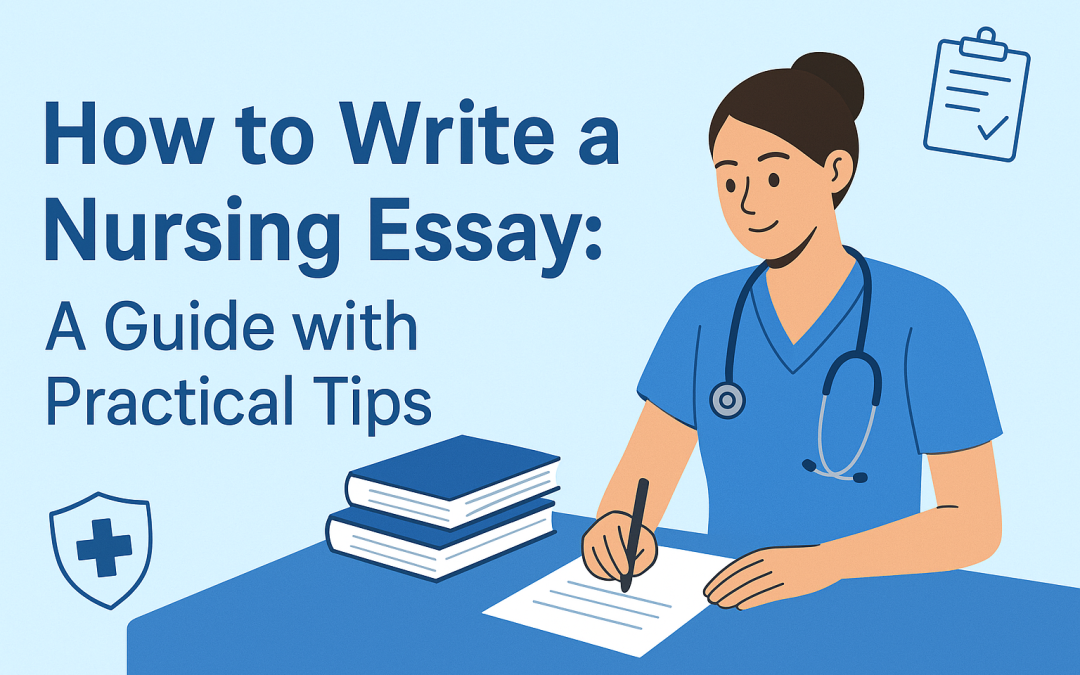You will definitely agree that when a lecturer says, “Your next writing project is a nursing essay,” most students can feel like they’ve just handed you a ticking time bomb. They smile, nod politely, and immediately start wondering how to start and complete on time.
If you are one of those students, you need to accept the truth: once you know how to write a nursing essay the right way, it’s not nearly as terrifying. In fact, you should take it as an opportunity to showcase your critical thinking, in-depth research, and communication skills. These skills will matter in your career later just as much as knowing which end of the stethoscope goes in your ears.
Keep reading this guide to know how to handle the process, step-by-step, with some practical tips.
Practical Tips on How to Write Nursing Essay
The following are practical tips that will help you develop the best writing skills and understand how to write a nursing essay with in-depth research, good structure, and clear analysis.
Step 1: Read the Assignment Brief Carefully
Some students just review the assignment brief with no due care, see the word count, and immediately get stressed. Don’t be that student.
Instead, thoroughly review the brief as a patient’s care plan. Missing or misunderstanding the details means you might write something completely off-topic. A brief is important, and one should take a careful approach to read it.
Do the following for decoding the brief:
- Topic: What exactly are they asking you to discuss?
- Focus: Is it theory? Application? Critical analysis?
- Word count: Respect it. Overwriting can be as bad as under-delivering.
- Referencing style: APA, Harvard, or some other academic alphabet soup.
- Deadline: It will arrive faster than you think.
If you’re not confident in any part, it is good to ask your lecturer. Don’t think others or the lecturer will think you’re silly. They’d rather respond to you and answer now than read a masterpiece on the wrong topic.
Step 2: Research Like a Professional, Not a Late-Night Googler
Strong, authentic evidence is the essence of a nursing essay. This isn’t the time for random websites or opinion blogs. For a credible foundation, use academic databases like:
- CINAHL (nursing and allied health literature)
- PubMed (medical research)
- Google Scholar (when used wisely)
Tips for research:
- Go for recent publications (last 5–7 years, unless discussing historical context).
- Use peer-reviewed journals.
- Filter results by relevance, not by “what’s easiest to read.”
For more advanced work, like when you’re mastering how to write a level 6 nursing essay, you’ll need to compare different sources, assess their reliability, and note where evidence is conflicting. This higher-level evaluation is what separates a pass from a distinction.
Step 3: Make a Plan (Think of It as a Surgical Checklist)
Would you not follow a checklist when performing a medical procedure? Hopefully not. If you don’t have a plan, you may just produce an unstructured and poorly organized assignment.
Your essay should follow a clear structure:
- Introduction – Present the topic, give background, and state your thesis.
- Body – Organized sections, each covering one main point supported by evidence.
- Conclusion – Summarize the main points and reinforce your argument.
A plan keeps your writing focused and persuasive, stops you from going off on tangents, and ensures your argument develops logically. Bonus: it makes the actual writing much faster.
Step 4: Craft an Introduction That Works Like a Firm Handshake
A good introduction is confident, clear, and concise. Avoid starting with cliches like “Since the dawn of time…”
Instead, in your intro:
- Explain why your topic is important in nursing.
- Briefly outline what your essay will cover.
- End with your thesis statement (the central argument you’ll prove.)
Remember that this is the very first impression of your essay. Plus, the first impressions matter in nursing practice.
Step 5: Build Strong Body Paragraphs
Think of each paragraph as a mini-essay:
- Start with a topic sentence that introduces your point.
- Present evidence from your research.
- Explain and analyze how that evidence supports your point.
If you’re writing at a higher level, like working on how to write a level 6 nursing essay, you’ll also need to:
- Contrast different viewpoints.
- Discuss study limitations.
- Link evidence to real-life nursing scenarios.
This shows critical thinking, a skill every lecturer wants to see in their students.
Step 6: Use Evidence Effectively
Throwing in random quotes doesn’t make your essay sound smart. Evidence is only powerful when you explain why it’s relevant.
Example:
❌ “According to Smith (2020), hand hygiene is important.” (No kidding.)
✅ “Smith (2020) found that structured hand hygiene protocols reduced infection rates by 35%, highlighting the importance of standardized practice in preventing hospital-acquired infections.”
One tells your reader nothing new. The other connects evidence directly to nursing practice. That’s why this part of a nursing essay can compel some students to approach assignment writing services for extra guidance.
Step 7: Keep Your Tone Professional, But Don’t Sound Like a Robot
Your essay should sound academic, but still human. Avoid slang, abbreviations, or overly casual phrasing. But also avoid stuffing every sentence with complex jargon, unless you want your reader to need a dictionary in one hand and a coffee in the other.
Step 8: Draw a Conclusion Like a Pro
Your conclusion is not the place for new information. Summarize your main points, restate your thesis in a fresh way, and briefly suggest the implications for nursing practice. End cleanly, suggesting that you avoid statements like “And that’s why nursing is important”.
Step 9: Edit With the Precision of Calculating a Drug Dose
The first draft is where you get your ideas down. The magic happens in editing.
Check for:
- Logical flow.
- Clear sentence structure.
- Consistent referencing.
- Grammar and spelling errors.
Step 10: Common Mistakes to Avoid
Here are a few ways students accidentally torpedo their essays:
- Ignoring the marking rubric.
- Using only one or two sources.
- Writing huge blocks of text without breaks.
- Forgetting to link evidence to the question.
Step 11: Time Management — Your Secret Weapon
Good essays are rarely written in one sitting. Break the work into smaller chunks:
- Research.
- Plan.
- Draft.
- Edit.
This approach reduces stress and means you’ll spend less time panicking and more time producing quality work.
Step 12: Knowing When to Seek Help
Sometimes you need guidance. You might look at a nursing essay writing service for examples and structure ideas. Just remember that these should be a learning resource, not a shortcut to avoid the work altogether.
Step 13: Balancing Life, Study, and Sanity
Between lectures, placements, and trying to remember what free time feels like, it’s easy to let essays slide to the last minute. Use planners, set mini-deadlines, and schedule breaks. Burning out won’t help you write faster.
Step 14: Don’t Compromise Academic Integrity
Plagiarism in nursing school is like malpractice in the hospital. It is a serious offense and can end your career before it starts. Always reference properly, paraphrase carefully, and never copy-paste from sources.
Step 15: Using Extra Resources Wisely
Sometimes students explore an online essay writing service or other assignment writing services for extra academic guidance. These can be helpful if you treat them like training simulations; they can prepare you, but they don’t replace the actual exam.
Final Thoughts
Learning how to write a nursing essay is about more than surviving an assignment. It’s about developing skills you’ll carry into your nursing career, including critical thinking, precise communication, and evidence-based reasoning.
Whether you use peer support, academic writing resources, or occasionally look at a nursing essay writing service for formatting examples, remember: the effort you put in now is practice for the professional challenges ahead.
Write with clarity, plan with care, and research like a nurse who knows every decision matters. Your grades and future patients will thank you.



